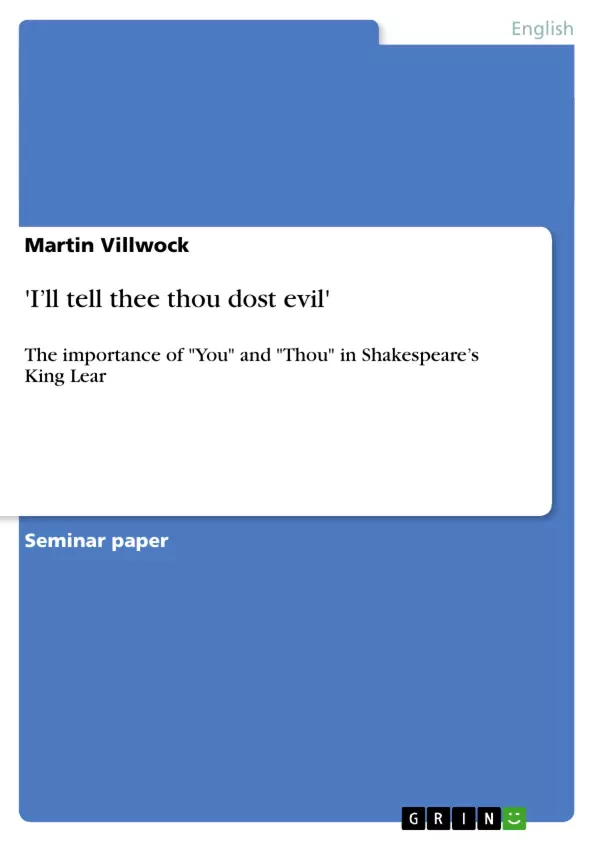In Middle English and Early Modern English one could choose either You or Thou (and their respective variants see Simpson et al. 2005: entry Thou, pers., pron., 2nd sing.). Either choice carried a number of implications, depending on the period of time in the language (Barber 1976:204-210). This system, which exists in many (but predominately European) countries is generally referred to as the T/V distinction.
Although similar to the German T/V distinction (Blake 1983:6), there is a phenomenon in Early Modern English, particularly in Shakespeare’s plays, which sets the You/Thou distinction apart. Whereas in German, French or Italian, it would be very rare and even rude to switch back and forth from T to V or the other way around, this must have happened quite frequently in Early Modern English dialogues (Brown and Gilman 1960:274-275). Eventually, of course, the use of Thou declined leaving the English language with only one second person pronoun, serving all cases without alteration (except possessive Yours and determiner Your) and both singular and plural (Görlach 1991:85).
A speaker of Early Modern English consequently had not only the option of choosing T or V once, he or she could also switch within a conversation, sometimes within a single utterance. The choice then would carry certain implications, about the emotions of the speaker, about his fondness or dislike of the addressee, or about the social ranks of both addresser and addressee. As a result, choosing the pronoun became a tool in dialogues that could be used to acknowledge or insult.
The T/V distinction will be discussed, its appearance in Early Modern English and particularly Shakespeare’s language. Then, in order to attain an achievable amount of research for a paper of this size, one of Shakespeare’s plays will be regarded with some detail. The choice fell on King Lear...
Inhaltsverzeichnis (Table of Contents)
- Introduction
- Shakespearean drama as a source for linguistic studies
- You and Thou in context
- The pronoun system in Early Modern English
- The T/V distinction
- Brown and Gilman's model: power and solidarity make the T/V choice
- Thou and You in Shakespeare's English
- The disappearance of Thou
- The importance of You and Thou in Shakespeare's King Lear
- Conclusion
Zielsetzung und Themenschwerpunkte (Objectives and Key Themes)
This paper examines the significance of the second person singular pronouns "You" and "Thou" in Shakespeare's play King Lear. It investigates the implications of these pronoun choices for character portrayal and emotional expression in the play.
- The evolution and usage of the T/V distinction in Early Modern English
- The role of power and solidarity in determining pronoun choices
- The social and emotional significance of using "Thou" and "You" in Shakespeare's plays
- The use of pronouns as a tool for politeness, insult, and social status in Shakespeare's King Lear
Zusammenfassung der Kapitel (Chapter Summaries)
- Introduction: This chapter establishes the historical context of second person pronoun choices in Early Modern English, highlighting the T/V distinction and its significance in conveying social and emotional nuances. It introduces King Lear as a case study for exploring the importance of pronoun usage in Shakespeare's plays.
- Shakespearean drama as a source for linguistic studies: This chapter discusses the value of Shakespeare's dramas as sources for understanding language use in the Early Modern period, particularly with regards to politeness and the T/V distinction. It compares the value of dramatic texts with other sources of Early Modern English, such as court records, and highlights the unique insights offered by Shakespeare's plays.
- You and Thou in context: This chapter delves into the historical development of the pronoun system in Middle English and Early Modern English. It explains the emergence of the T/V distinction, tracing its origins and its significance in conveying social and emotional relationships between individuals. It also discusses Brown and Gilman's model for understanding the T/V distinction as a reflection of power and solidarity dynamics.
Schlüsselwörter (Keywords)
The main keywords and focus topics of this work include: Early Modern English, T/V distinction, second person singular pronouns, power and solidarity, Shakespeare, King Lear, character portrayal, emotional expression, politeness, social status, and language use.
- Quote paper
- Martin Villwock (Author), 2005, 'I’ll tell thee thou dost evil', Munich, GRIN Verlag, https://www.grin.com/document/81419



